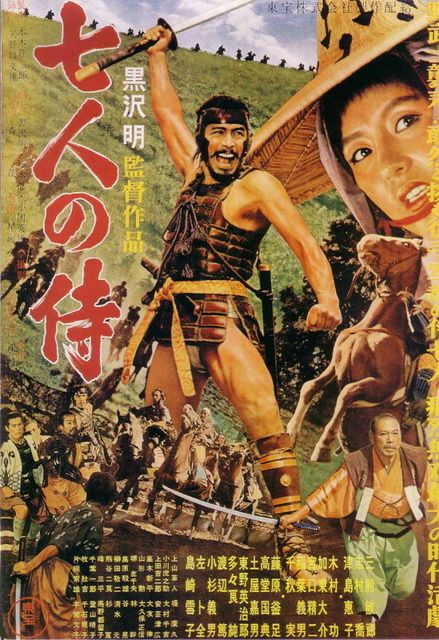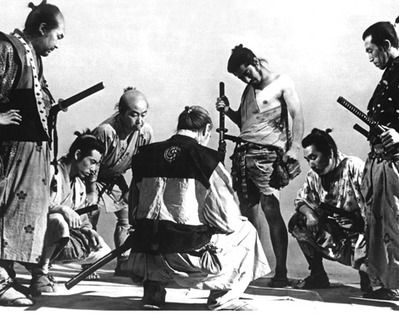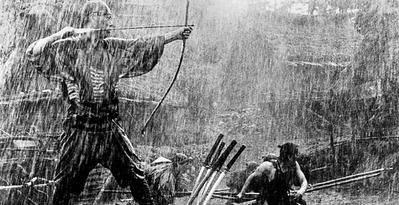The Seven Samurai

The Seven Samurai
1954
Director: Akira Kurosawa
Starring: Toshiro Mifune, Takashi Shimura
I tend to complain a lot about movies with running times greater than three hours because I apparently have the patience of a squirrel on crack. With a total running time of 207 minutes, you would think that The Seven Samurai earns my wrath. Sorry to disappoint, but The Seven Samurai manages to do what most epic films simply cannot: hold my interest with a meaningful, rich, and varied story filled with characters with which I enjoy spending my time.
The plot of The Seven Samurai is tremendously simple: some samurai soldiers are recruited to help a poor farming village fend off a bandit attack. We open by seeing the bandits ride up to the village in question but decide to postpone their attack until the rice harvest is in. This prompts a great deal of wailing and weeping from the villagers, who are poorer than poor. They send emissaries to a nearby town to find samurais who will work simply for food and honor rather than money. The first one they find is Kanbei: older, sharper, and with a great deal of nobility. He is doing this because it is the right thing to do. With Kanbei on board, five other samurais sign up, along with a samurai apprentice and a pesky samurai wannabe Kikuchiyo (Mifune). Back at the village, the samurai deal with frightened and, frankly, stupid villagers, train them, wall off the perimeter, all in preparation for the impending siege.

What makes this the classic that it rightly is, is the simple fact that The Seven Samurai is a very entertaining film. Through the very simple premise, Kurosawa goes to town, playing with so many different ideas. Of course, the very subject matter is an ode to traditional great swordplay stories, and the plot seems to draw from traditional Japanese folklore. On top of this scaffold are laid some serious trappings of socioeconomic commentary; the farmers lives are absolute hell, and their poverty is absolute. Kurosawa doesn’t try to hide this from us at all; we are in there with the muck and grime and filth, stricken to the extent that a bowl of rice is considered a luxury. There is also humor, popping up at unexpected moments. Most of this comes from Mifune’s character, an utter buffoon who fancies himself a samurai simply because he hangs around with others. Luckily, the film tempers his utter absurdity with moments of heroics and poignancy, making him relevant and not simply a jester.
In between all the depression you’ll feel at the farmers’ plight and the giggles you’ll get out of Mifune, you’ll be pulled in by the fascinating study of war strategy this also provides. There are eight samurai in one form or another - it’s worth mentioning that it’s never clear if it is Kikuchiyo or the apprentice who is the seventh of the title - and forty bandits on horses. In order to successfully fight off the bandits, the samurai have to be smart. The tactics they employ are rather ingenious. The siege, which encompasses about the last third of the film, is one of the most interesting film battles I’ve seen, and that’s due to how it’s filmed. Instead of an hour long non-stop onslaught (which most directors would be tempted to do, methinks), Kurosawa spaces his battle out over several days and nights, which provides beats of rest and quiet in between the mayhem. The samurai keep count of the bandits they have dispatched of; we are impressed when six bandits are killed at the first attack, but we know that our village has a long way to go yet. You feel that sense of grueling perseverance.
There is also fundamental human drama in almost every corner of the film. A dying woman handing her child to the samurai, unexpected fatal attacks on the village, the men giving up their rice for an old ailing woman; Kurosawa knows how to pull at the heartstrings. It’s all part of feeling the magic of The Seven Samurai; it has so much to keep you entertained. There’s even a romantic subplot thrown in for good measure. All of this works because the plot is so simple. We always come back to the idea of the attack, no matter what little side story is being told. One moment you’re laughing, and the next, you’re shaking your fist in anger.

My favorite character of the film was easily that of Kanbei. He is the orchestrator, the organizer, the master strategist, and, in the first hour, the recruiter as well. Through sheer force of personality, he manages to attract other noble samurai to the cause. Shimura has tremendous gravitas in the role, fully inhabiting the quiet and clever character. When Kanbei is still, you know he’s thinking of something. Rather funnily, my least favorite characters were the villagers. They were utterly undeserving of the quality of help the samurai provided. Ignorant, ungrateful wretches who, as soon as they realized that they had eight men coming to defend their village with their very lives, started worrying that these samurai would start raping every woman in town. Ultimately, though, I think this is Kurosawa’s point; these samurai are willing to do the right thing for the wrong people. It is *not* about payment, it is *not* about reward; it is about helping those who would otherwise fall prey to others, even if they don’t deserve it.
Now, having said all of this, I will add that this is not my favorite film by Kurosawa. I think of Throne of Blood or especially Ikiru for that particular honor. Ultimately, despite great moments of poignancy, this is a film that comes up feeling a little light to me. Kurosawa, although fundamentally a showman of a director, also has the capacity to be profound; he dabbles in that in The Seven Samurai, but really achieves it better in other films. Plus, well, it’s 207 minutes long, and as I mentioned in the intro, I don’t have a lot of patience for tremendously long movies. This one kept me interested, sure, but it’s still really long. I do not dare doubt its place in the pantheon of world cinema, but it will never be a movie I “just throw in” to the DVD player.
Arbitrary Rating: 9/10. I really really really really like it. I’m not sure if I love it.